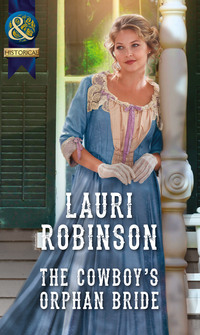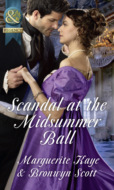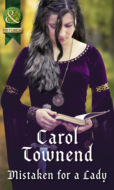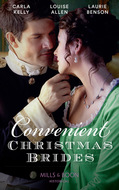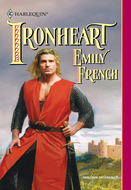Raamatut ei saa failina alla laadida, kuid seda saab lugeda meie rakenduses või veebis.
Loe raamatut: «The Cowboy's Orphan Bride»
Reunited with the cowboy!
Long ago, orphans Bridgette Banks and Garth McCain made a promise to stay together. But it’s been years since they were parted, and Bridgette’s almost given up hope! So when Garth’s cattle trail passes her town, she won’t let him leave her behind again...
Sparks fly as they’re reunited—especially when the cowboy catches Bridgette telling everyone she’s his bride! Faced with a past he thought he’d lost forever, Garth realizes this impulsive beauty might be the future he never thought he deserved.
“I told you—I’m here to help. Nothing more.”
Garth’s eyes took on a smoldering tint that caused her heart to thud. Without looking away, he leaned closer.
“You have helped,” he whispered. “And I’m going to kiss you.”
Fully unprepared, Bridgette had no response.
Allowing that to happen was a huge risk, but the moment his lips touched hers she knew it was the right decision. An expansive thrill raced through her system and she looped her arms around his neck.
Her lips parted at the first flick of his tongue and the battle was on. Her tongue against his. It was the most dedicated fight they’d ever had. He went on until they were both winded, and then their lips separated by some mutual consent.
However, as their eyes met their lips met again. That first kiss had immediately become an exploration of unfamiliar ground, but this time it was a gentle journey of territory already discovered and appreciated. She’d known him for years, yet hadn’t experienced the depth of that right now. And, just as she’d imagined, kissing him was utterly amazing.
Author Note
The “orphan trains” that distributed children across the plains for over seventy-five years have always intrigued me, and I was excited to finally create a story involving this piece of history.
From the moment I started plotting this book I knew the hero and heroine had traveled west together as children. They hadn’t been childhood sweethearts as much as they’d been the anchor that each of them had needed. Then, as I started writing the story, the characters took over, changing the plot I’d originally created, because although they’d “gone their separate ways” they both still craved the one person who’d made a difference in their lives. Each other. But neither of them is ready to admit it.
I hope you enjoy Garth and Bridgette’s story as much as I enjoyed creating it.
The Cowboy’s Orphan Bride
Lauri Robinson

A lover of fairy tales and cowboy boots, LAURI ROBINSON can’t imagine a better profession than penning happily-ever-after stories about men—and women—who pull on a pair of boots before riding off into the sunset...or kick them off for other reasons. Lauri and her husband raised three sons in their rural Minnesota home, and are now getting their just rewards by spoiling their grandchildren. Visit: laurirobinson.blogspot.com, Facebook.com/lauri.robinson1 or Twitter.com/LauriR.
Books by Lauri Robinson
Mills & Boon Historical Romance
Daughters of the Roaring Twenties
The Runaway Daughter (Undone!)
The Bootlegger’s Daughter
The Rebel Daughter
The Forgotten Daughter
Stand-Alone Novels
The Major’s Wife
The Wrong Cowboy
A Fortune for the Outlaw’s Daughter
Saving Marina
Western Spring Weddings
“When a Cowboy Says I Do”
Her Cheyenne Warrior
Unwrapping the Rancher’s Secret
The Cowboy’s Orphan Bride
Mills & Boon Historical Undone! ebooks
Rescued by the Ranger
Snowbound with the Sheriff
Never Tempt a Lawman
Visit the Author Profile page
at millsandboon.co.uk for more titles.
MILLS & BOON
Before you start reading, why not sign up?
Thank you for downloading this Mills & Boon book. If you want to hear about exclusive discounts, special offers and competitions, sign up to our email newsletter today!
Or simply visit
Mills & Boon emails are completely free to receive and you can unsubscribe at any time via the link in any email we send you.
To my critique partner, Paty Jager.
Thanks for always being there to bounce ideas off!
Contents
Cover
Back Cover Text
Introduction
Author Note
Title Page
About the Author
Dedication
Chapter One
Chapter Two
Chapter Three
Chapter Four
Chapter Five
Chapter Six
Chapter Seven
Chapter Eight
Chapter Nine
Chapter Ten
Chapter Eleven
Chapter Twelve
Chapter Thirteen
Chapter Fourteen
Chapter Fifteen
Chapter Sixteen
Chapter Seventeen
Chapter Eighteen
Chapter Nineteen
Chapter Twenty
Chapter Twenty-One
Extract
Copyright
Chapter One
Central Kansas, 1877
“Those damn cowboys!”
Bridgette Banks tightened every muscle against the way she’d flinched at Cecil Chaney’s outburst and how he slammed the door. Neither was unusual, she just hadn’t expected him to be home so soon. He’d barely been gone an hour, probably less. Which should not have surprised her. He had to be the laziest man she’d ever encountered.
“I’ll shoot the lot of them if a single one steps foot on my property!”
She dried her hands with her apron before turning away from the boards nailed to the wall to form the crude counter barely large enough to hold the dishpan. “A cattle drive is near?”
“Of course a cattle drive is near,” Cecil barked. “I just said as much, didn’t I?”
“No, you said you’d shoot every cowboy.” She didn’t point out there wasn’t a reason anyone would want to step on his property.
The chair creaked as Cecil dropped his heavy frame on the seat. “Same thing.”
“No, it’s not,” Bridgette insisted. Arguing, especially with Cecil, got her nowhere, but she’d quit caring about that. His constant complaining had frazzled her nerves since the moment she’d arrived. He complained when it was hot. Complained when it was cold. Complained when it rained. Complained when it didn’t. His attitude was exhausting. As had been living in his house the past six weeks. Keeping her voice hushed, she said, “You may want to see if they have a cow you can buy. One nursing a calf. The milk is needed, as is the butter and cream.”
“Where am I supposed to get the money to buy a cow?” he snarled.
She bit her tongue to keep from saying he could forgo a few bottles of the hooch he bought from Graham Linkletter and kept stashed behind the barn. Turning around, she picked up the water basin. “Perhaps you could make some sort of bargain with them.” Walking to the door, she added, “Emma Sue could use the nourishment, even more once the baby arrives.”
“I’ve used up all my bargaining on you.”
Bridgette ignored the disgust lacing his words. Telling him she could leave at any moment would be the most wonderful thing ever. Except for Emma Sue. Goodness, what that woman saw in Cecil, how she’d ever lain with him, become pregnant, took more imagination than Bridgette had. She’d rather bed down in a den of snakes than next to Cecil Chaney. His breath alone was enough to make her eyes water.
“That’s what you’re here for.” Cecil’s shout followed her out of the door. “To make sure Emma Sue has nourishment. Meals and rest so she can pop out that baby alive this time. Doctor’s orders.”
The desire to slap him made Bridgette’s hands shake. The fool had no idea how lucky he was to be married with a baby on the way. To have a family. Knowing she couldn’t slap him, at least shouldn’t, she pitched the water out of the basin with such force dirt splattered across the bottom of her skirt. That increased her ire. There was more than enough to do around here and washing clothes more often than necessary was not a welcomed chore. Reminders of her duties were not necessary, either. Being farmed out to women nearing their delivery time had been her job for over six years. Ever since she’d turned twelve. Others on the Orphan Train had said she was lucky to be adopted by a doctor and his wife. They wouldn’t think so now.
“Where is she?”
Containing her thoughts, Bridgette held her attention on wiping the inside of the basin with her apron as she walked back into the two-room shanty made of square blocks of sod. She’d seen many houses just like this one since being taken in by Dr. Rodgers and his wife. Those who lived in homes made out of wood usually had their own help, or other family members, when someone was ailing. That’s what she’d have someday, a house made of wood, not dirt. And a family all of her own.
“Your wife is resting,” Bridgette said. Emphasizing exactly who she was here to help was a waste of breath, but so would telling him to be quiet. It wouldn’t have done any good when he’d stormed into the house and it wouldn’t now.
“Already? We just ate breakfast.” He harrumphed. “She slept all night. Better than me.”
His pouting increased Bridgette’s ire. He was big and homely with black hair so greasy lice couldn’t catch enough footing to live in it. And no one had gotten any sleep last night except him. Half the town of Hosford probably heard his snoring, and that was four miles away.
Keeping those thoughts to herself, she removed her apron and switched it out for the other one hanging on the nail. “Creating a new life is hard work on a woman’s body.”
“It’s been happening since the beginning of time, girlie.”
“And women have been dying from it for just as long,” she answered, walking out the door.
“Where are you going?”
“Someone needs to water the garden,” she shouted over her shoulder. Then for her own ears only, muttered, “Lord knows those weeds won’t grow on their own.” There were pitiful gardens, and then there were pathetic gardens. To call this one merely pathetic would have been a compliment.
The entire acreage of the Chaney place could be described as pathetic. It didn’t have to be that way, but Cecil had the ambition of a slug. Emma Sue didn’t, which could explain why she’d lost two babies already. Last year and the year before. Both times Cecil had refused Dr. Rodgers’s suggestion of help so Emma Sue could rest. Bridgette wondered if Emma Sue’s father, who managed the land office in town, had been the one to pony up the extra cost of her staying at the Chaney place. There was no love lost between Douglas Phalen and Cecil, but Douglas must still love his daughter.
Love. Bridgette sighed heavily. Sometimes, the older a person got, the more love they needed. She fully understood that, and hoped someone loved Emma Sue. She was sweet and kind. Quiet and gentle. The exact opposite of her husband in every way. While Emma Sue was tiny and delicate, Cecil had the shape and coordination of a drunken bull.
Bridgette smiled at her own wit. Of course bulls didn’t drink, but if one did, it would look exactly like Cecil. Smell about the same, too.
Stopping as she rounded the corner of the house, Bridgette lifted her face to the sky. The summer sun blazed down enough arid heat to make plants curl their leaves. She didn’t mind. It was hot, but the brightness and fresh air were a wonderful reprieve from dark and gloomy dankness inside the sod shanty.
She closed her eyes and let the sunshine fill her. Cleanse her. A thud inside the house made her open her eyes and sigh. Feeling fresher and lighter, she pinched her lips as a silly image formed. That of the chair collapsing under Cecil. Smiling, she made her way to the garden.
A short time later, sweat trickled down her back as she drew water from the well and carried bucket after bucket to the tiny fenced-in area behind the house. Careful not to waste a drop, she watered only the vegetables, plucking out weeds as she made her way up and down the meager rows. The only thing producing were the bean plants. She’d have to pick them again today.
She should be happy about that. Six weeks ago, critters were eating anything that popped out of the ground. The fence had done wonders. No thanks to Cecil. He’d merely pointed out where there was some old lumber. Mr. Phalen had brought out the wire when coming to visit Emma Sue one day.
Too bad he hadn’t brought out jars. She wanted to can the beans so Emma Sue would have a few more reserves come snowfall. Mrs. Winters had taught her how to can practically anything several years ago when she’d stayed with the Winters family for an entire fall, but asking Mr. Phalen to provide jars was out of the question. Emma Sue refused to ask her father for things. Said Cecil didn’t approve of her doing so.
Therefore, despite Cecil’s complaint that he didn’t like green beans, there would be more on the table for lunch, and supper.
Bridgette had no idea what made her stand up and gaze southward, beyond Cecil’s scrawny and scraggly field of wheat. An irrigation ditch from the creek that flowed freely not too far past the line of barbed wire Cecil had erected to keep others off his property could turn that wheat into strong, flourishing stalks. Emma Sue said no one owned that land, but diverting the water would be too much work for Cecil.
To hear Cecil talk, walking was too much work for him. Bridgette hadn’t mentioned that to Emma Sue, or that the land next door was the piece Cecil should have bought, but she’d thought it. That creek flowed from the river and would provide plenty of water for people, animals and crops.
That’s what she wanted, and would have. Someday. A piece of land with plenty of water and good, fertile soil, and a solid house made of wood, with floors and windows and a real cookstove complete with an oven. And it would all be hers. Truly hers. A place to plant roots. She’d be the one having babies then, children she’d welcome and love with all her heart and never, ever, let out of her sight.
Bridgette continued to scan the horizon. The land was so flat a person could watch a bird fly away for days. New York hadn’t been like that, what she could remember of it, and the land between here and there had been decorated with rolling hills and trees. And houses, big ones surrounded by flowers and fences.
Her house would be surrounded by trees. Big leafy ones that would provide shade from the summer sun and protection from the cold winter winds.
She grinned at the thought, and how memories started to form. Those of playing games with the other children on the train, each guessing what they might see next.
Her heart fluttered slightly when she recalled how Garth had predicted he’d see an elephant. Everyone had laughed, but minutes later, they’d pulled into a train station, and sure enough, there, on another train, had stood an elephant.
She rarely thought of the other orphans who’d been shipped West with her all those years ago, except for one. A day hardly passed, even after all these years, when she didn’t think of him.
“Garth McCain,” she whispered. “Whatever happened to you? Do you even remember the promises we made?”
Bridgette let her mind roam and wondered if she’d recognize him when she did see him again. Not if. When. Garth would find her. He had to. Otherwise all her years of waiting, all their promises would be for naught, and she refused to believe that. His hair would surely still be brown, and his eyes. He’d be taller, but she couldn’t imagine he’d have grown fat. Not like Cecil.
She shook aside a shiver at comparing Garth to Cecil, and her gaze settled on a spot on the horizon. There was nothing distinguishable, but the gray haze said something was there. The cattle drive Cecil had mentioned, most likely. They traveled through this region each summer, on their way to Dodge City.
Unlike Cecil, the small town of Hosford welcomed the cattle drives. Dodge was still twenty miles north, and though the cowboys rarely entered town, the trail bosses often did, restocking supplies for the last leg of the long trip they’d embarked upon months before down in Texas.
She’d never been to Dodge, but she’d heard it was a wicked and wild town. Where soiled doves ran naked in the streets and men chased them, whooping and hollering when they caught one of the women.
It wasn’t for her to say if that was true or not, but she’d like to see if it was. Dr. Rodgers and his wife, Sofia, whom, even after nine years, Bridgette still referred to as Mrs. Rodgers, would be horrified to know she wondered about such things, therefore she never mentioned her curiosity. Not to anyone.
In the nine years since she’d left the Orphan Train, there hadn’t been anyone to share secrets with, not like she had Garth. He’d known all her secrets, and she’d known his.
Staring at the gray haze rising from the ground to faintly obscure the blueness of the sky, she sighed. “It’s been a long time, Garth,” she whispered. “And I’m getting tired of looking for rainbows.”
“Are you done out there?”
Bridgette breathed through the spine-crawling sensation of Cecil’s shout before grabbing the empty water bucket. Leaving the garden, she swiped aside the hair that had escaped her bun to tickle her cheek. “Baby Chaney,” she mumbled, “if you want to meet your father, you best hurry up. He’s getting close to being whacked by a frying pan.”
Chapter Two
“Mr. McCain!”
Garth twisted in his saddle to watch a cowboy ride through the haze of dust. The herd was anxious to get moving this morning, butting into one another as they found their place to start marching north. Churned up by thousands of hooves, the dirt stung his eyes as it swirled in the wind. He used the back of one hand to wipe his lips before asking, “What?”
One of the drovers, Martie, Brad Martie, who should be riding drag, rode up beside him, and shifted the reins from his left hand to his right and back again.
Twisting the tension in his neck, Garth cursed beneath his breath. He hated men who fidgeted almost as much as he hated whiners. Calling Brad a man was stretching it. The red fuzz on Brad’s chin said he wasn’t much more than a kid. Having just completed a ride from the rear to the head of the herd, doing a final check before heading out, Garth had already eaten enough dust. He gestured for Brad to follow him a short distance away from the cattle before he repeated, “What?”
“A heifer let loose.”
Garth tipped back his hat and wiped away a band of sweat before it dripped into his eyes. The sun was hot today, and the cattle would need water come evening. Hence their excitement to get going. A cow could smell water miles away. “Which one?” he asked.
Switching hands on the reins again, Brad answered, “The big white-faced one.”
Garth cursed beneath his breath. He was hoping that one would make it to Dodge. In truth, he hoped they all would make it to Dodge. They couldn’t be more than four, maybe five days out. That heifer was a fine specimen and her calf would have brought good money. He’d hauled a calf in the chuck wagon before, for a day or two. Five was too long. The separation would be too much on the cow, and the calf could never keep up on its own. Not only would it slow down its mother, they both would easily become trampled by the others. He felt the loss of every cow, and didn’t like it, but there were plenty of things about a drive that weren’t easy. The loss of any life was the worst, but he couldn’t jeopardize the herd or a man’s life over one calf. His stomach clenched, but still he ordered, “Shoot the calf.”
The revulsion that rippled across the young man’s face pulled Garth’s jaw so tight his back teeth clenched.
“Couldn’t we find a sodbuster and give it to them like we did down south?” Brad asked, with a goodly portion of hope lacing his young voice.
“No,” Garth said. “I don’t have time to roam the countryside searching for sodbusters.” The sorrow on Brad’s face reminded him of years ago, when he’d been fourteen and shipped West with a trainload of sad-eyed, snot-nosed kids. They hadn’t all been snot-nosed. Not Bridgette Banks. She’d been the one wiping everyone else’s noses. Taking care of everyone else. That had been her. And of all the things he’d tried to forget about his life back then, she was still the hardest. For all his efforts, he just couldn’t erase her from his mind.
It had been years, but he’d bet his best horse she was still as cute as she’d been back then. He’d yet to see a pair of eyes as blue as hers. He’d bet, too, that her feathery blond hair would still catch in the corner of her mouth when she spouted off over some infraction or another. Though she’d looked sweet and angelic, she’d had the mouth of a New York orphan. He’d appreciated that. Others hadn’t. Especially not Mrs. Killgrove.
He hoped the family that had adopted her had treated her well over the years. She deserved that. That’s all she’d ever wanted. A family. A home. A place she could call her own and people to love. She’d still been on the train when he’d been sold. That’s what it had been. An auction not so unlike the old slavery traditions, except there was no money exchanged for the boys, only promises of providing food and shelter by bidders who didn’t want a child, but a worker. One they didn’t have to pay.
Pulled back to the present by mooing cows, Garth looked at Brad while gesturing toward the cattle. “See that herd? They haven’t had water in two days. That’s my job today, to find water, not sodbusters. If I don’t find water, none of us will sleep tonight. We’ll all be riding guard, hoping they don’t stampede.”
Brad nodded, but didn’t look convinced.
Garth held his temper in order to say, “We gave those calves down south to Indians so they’d let us pass through their territory without any issues. A sodbuster would need to have a cow that would let that calf nurse, and that’s not easy.” Cows didn’t take to orphans any better than humans did. Flustered by having to give a drover a school lesson, Garth spun his horse around. “Shoot it.”
He kneed his horse into a run, and didn’t let it slow until the dust was well behind them. The thought of ordering Brad to put down that calf reminded him of his first drive. He’d been fifteen, and had been assigned to ride drag the entire trip. Afterward he’d sworn that would be the last time. He’d taken it upon himself to learn what it took to be a trail boss, the good and the bad. Putting down that calf was the bad, as was doing the work of two men when he was a man short. That, being a man short, unfortunately, had happened more often than he’d liked over the years. There were just too many men out there who had signed on thinking a trail drive was little more than a stroll to church on Sunday. He’d never regretted a one that had left his employ. If you couldn’t do what had to be done, you’d never amount to anything. That was his motto. Being in a saddle for sixteen hours a day wasn’t unreasonable, and he let go any man who thought otherwise.
Not a one of the men he’d fired had stolen from him. Other trail bosses sometimes discovered men had taken off with a horse from the outfit’s remuda after being fired. He didn’t. He laid down the law on exactly how a thief would be dealt with from the day he hired a man, as well as plenty of other expectations. He lived by the rules he set as strongly as he laid them out.
Despite what some liar in New York had said all those years ago, he’d been honest his entire life, and expected as much from others.
There were fifteen men in his outfit, not counting himself, JoJo—the best trail cook God ever gave a frying pan to—and Bat, JoJo’s helper. While riding alongside the herd, even as his thoughts roamed, Garth counted heads. Human ones. He hadn’t lost a single hand on this trip, and was more than relieved about that. He was pleased, too, and would be the first to admit it took a lot to please him.
Satisfied with the number of men he’d counted and confident the cattle were moving at a solid pace, Garth forced himself to put the calf out of his mind and rode past the point riders to catch up with JoJo.
The chuck wagon always traveled a few miles ahead of the herd, and as Garth rode, the calf crossed his mind again. Even if he found a sodbuster to take it, the calf wouldn’t have much of a chance. Orphans as a whole didn’t stand much of a chance. He was reminded of that every time he traveled north into Kansas.
If the orphanage hadn’t taught him that, the farmer who’d taken him off the train had. He’d spent over a month with Orson Reins before deciding he’d had enough. Orson had said from the moment Garth had arrived at his farm that you could take a boy off the street, but the only way to take the street out of the boy was with a whip. When Orson had broken out his whip again, something had snapped inside Garth and he’d wrestled the whip out of Orson’s hands and left.
He’d carried that whip with him for five years, until one night when he’d burned it, concluding his past was well and gone. He was never going back, so there was no need to hold on to any reminders of his past.
“Heading out, Boss?” JoJo shouted above the rattling of his chuck wagon.
Garth caught up with the wagon, and then reined in his horse next to where JoJo sat on the wagon seat. “I remember some water being a short distance ahead.”
“Still figure we’re about five days out?” JoJo asked.
“Four if we’re lucky.”
“You’re lucky all right,” JoJo answered with a laugh. “This trail is working out for us. You know I had my reservations.”
“You liked the Chisholm,” Garth answered. On his way south last year, he’d veered west to explore the Great Western Trail. Some swore by it, others claimed it was cursed. The same was true for the Chisholm.
“Was used to the Chisholm,” JoJo said. “Knew every hill and water hole on that trail. So did you.”
“We did,” Garth admitted. He’d chosen the Great Western this year because these were his cattle being driven north. After spending all winter acquiring and paying room and board for the whole lot of four-footed beasts, he needed to get top dollar.
“But Dodge is paying more than Wichita right now, so we took this one,” JoJo supplied, rubbing his scruffy gray beard with one hand.
Garth nodded. “You’re smarter than you look. Guess you do have a brain under that bald scalp.” Though Wichita was still accepting cattle, the days of the big drives were limited. The farmers were putting up too much of a fuss and the townspeople were agreeing with them, laying down more and more rules for the cattlemen to follow.
JoJo pointed a finger. “And your mug is uglier than you think.”
Garth laughed. “I never claimed to be handsome, but can’t say I’ve had any complaints, either.”
JoJo chortled, and rubbed his beard a bit more when he asked, “What you gonna do with all that money you’re gonna make on this trip? Got yourself a woman holed up somewhere?”
Garth laughed. A woman was the last thing he wanted. “If I did, I sure wouldn’t tell you about it. You’d try stealing her.”
JoJo laughed so hard he coughed. With watery eyes, he said, “Not me, but Bat might.”
“Uh-uh,” Bat said, shaking his head. “I don’t want no woman telling me what to do.”
Bat was the youngest on the drive. Too young really, maybe ten or twelve, but JoJo wouldn’t leave Texas without the kid he’d found somewhere over the winter. Knowing the options for an orphan too well, Garth had agreed the boy could join them. He wasn’t sorry, either. Bat was a good little worker and certainly earned his wage.
The boy was an added bonus, to Garth’s way of thinking. Bat was the reason JoJo had been willing to leave the outfit he’d been with for the past several years. JoJo never said Evans wouldn’t let a kid join his drive, hadn’t needed to. Bottom line was Evans’s loss had been Garth’s gain. An outfit needed a good cook, and JoJo was one of the best. Even though he was a bit cantankerous at times, and full of himself.
“Now that’s smart thinking if I ever heard it,” Garth said to Bat.
The boy grinned and sat a bit taller on the wagon seat.
“Malcolm sure was sad to see you leave,” JoJo said.
Malcolm Johansson, the man who’d hired him when he’d been as green as grass, was still a trusted friend and a man Garth was thankful to have met. Malcolm was a hard man, but an honest one, and had taught Garth a lot about life. “I told him my plan the day he hired me.” A plan he was still working on. That’s how he did things, thought each detail out thoroughly before putting them in place, and then followed them through to the end. That had been the one lesson he’d learned back at the orphanage that he’d held on to. Not thinking things through made for a tough life.
“I heard as much,” JoJo said. “But Malcolm was still sad to see you leave his employ.”
“Sam Taylor will serve Malcolm well,” Garth told JoJo the same thing he’d told many others when they’d questioned him leaving Johansson’s employ. “He’s been driving cows to Wichita for years.”
“Yeah, he will,” JoJo said. “But Sam Taylor ain’t no Garth McCain.”
Coming from JoJo, that was a compliment like no other, and Garth figured it was a good place to end the conversation. “I’ll be back in time for the evening meal,” he said, tapping his heels against his horse.
Tasuta katkend on lõppenud.
